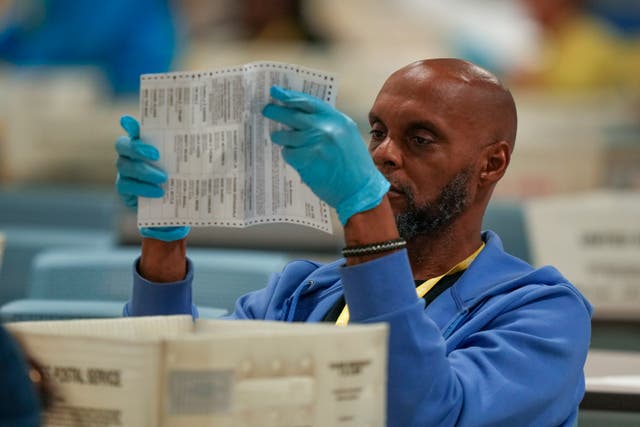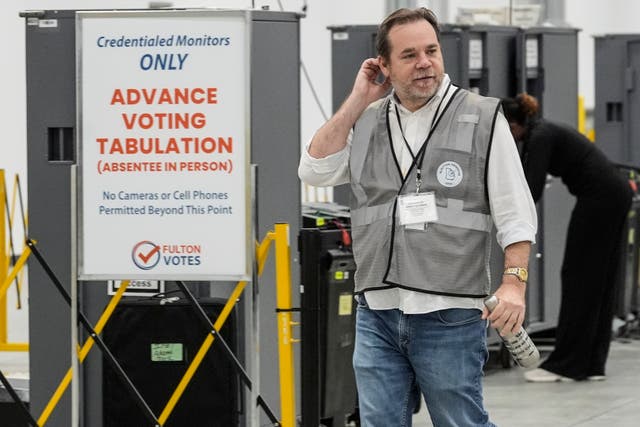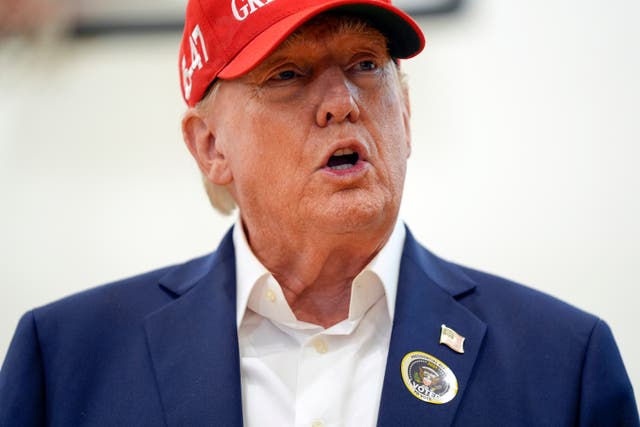
A mostly smooth Election Day across the US has been marred in multiple battleground states by a series of bomb threats and baseless claims of wrongdoing by former president Donald Trump.
The bomb threats in parts of Arizona, Georgia and Pennsylvania turned out to be hoaxes, but forced evacuations and some polling places to extend hours.
The threats were reported throughout the day at polling locations in three metro Atlanta counties, all with large numbers of Democratic voters, and into the evening at voting locations in Pennsylvania, forcing evacuations. Bomb threats were also reported at three voting locations in Navajo County, Arizona, according to the secretary of state’s office.
In an evening news conference, Pennsylvania governor Josh Shapiro acknowledged there had been multiple bomb threats called in to voting locations across the state, but said so far there is “no credible threat” to the public.

“Every legal, eligible vote will be counted and counted accurately, and the will of the people in the commonwealth of Pennsylvania will be respected,” said Mr Shapiro, a Democrat.
In a statement, the Pennsylvania State Police said they were working with local partners to respond, if needed. Neither Mr Shapiro nor police gave more details about who might be behind the bomb threats or why Mr Shapiro believed there was no threat to the public.
In Georgia’s Fulton County, which includes Atlanta, 32 of 177 polling places received bomb threats and five were briefly evacuated. The FBI on Tuesday afternoon said it was aware of multiple hoax bomb threats to voting locations in several states and said many of them appeared to originate from Russian email domains.
“Georgia’s not gonna be intimidated,” Georgia secretary of state Brad Raffensperger said on Tuesday.

And despite no evidence of widespread voting problems, Mr Trump made unsubstantiated claims related to Philadelphia and Detroit, and raised questions about election operations in Milwaukee, the biggest cities in three states that will be crucial for deciding the presidency.
Local officials quickly knocked down the claims Mr Trump made on his social media platform, saying there were no indications of any problems that would affect accurately tallying the vote.
The absence of any significant, widespread problems had not stopped Mr Trump, the Republican nominee, or the Republican National Committee, from making numerous claims of fraud or election interference during the early voting period, a possible prelude to challenges after Election Day.
In Georgia, a federal judge rejected as “frivolous” a last-minute effort by Republicans to challenge Atlanta-area election offices’ collection of postal votes last weekend – after early voting had ended. US district judge R Stan Baker, a Trump appointee, said the Republican argument “does not withstand even the most basic level of statutory review and reading comprehension”.
Mr Trump on Tuesday suggested he would not challenge the results of the election – as long as it is fair.
“If it’s a fair election, I’d be the first one to acknowledge” the results, Mr Trump said, though what meets that definition was not clear.

As Election Day voting neared its end, the former president began making unsubstantiated claims about voting and law enforcement in the biggest cities in Michigan, Pennsylvania and Wisconsin.
He said on his social media platform that there was “talk about massive cheating in Philadelphia” and said law enforcement was on the way. He did not provide details, and there was no immediate indication of what he was referring to. His spokespeople did not respond to requests for comment about what he meant.
Philadelphia district attorney Larry Krasner issued a statement rejecting Mr Trump’s claims as baseless.
“There is no factual basis whatsoever within law enforcement to support this wild allegation,” Mr Krasner said. “If Donald J. Trump has any facts to support his wild allegations, we want them now. Right now. We are not holding our breath.”
Federal election security officials and Mr Shapiro also said they had seen nothing to support Mr Trump’s claims. Officer Miguel Torres of the Philadelphia Police Department said he was unaware of any special law enforcement mobilisation or “any kind of incident” that would require it.
One of three Philadelphia election board members, Seth Bluestein, a Republican, said on social media there is “absolutely no truth to this allegation. It is yet another example of disinformation.” Voting in the city is “safe and secure,” he said.
Police in Detroit were equally puzzled by another post by Mr Trump that said: “Philadelphia and Detroit! Heavy Law Enforcement is there!”
Detroit police said there were no reported issues inside or outside of Huntington Place, the massive convention room where election workers were to count ballots.
Evening traffic outside the centre was light with no protesters in sight. Barricades were up outside the room and escalators to and from the area were shut off. Police also reported no major problems in the city’s more than 400 voting precincts.

Mr Trump’s Democratic opponent, vice president Kamala Harris, has urged voters not to fall for Mr Trump’s tactic of casting doubt on elections. She was spending Tuesday afternoon turning out her own vote at a phone bank hosted by the Democratic National Committee, and said phone banking represents “the best of who we are”.
In Milwaukee, election officials said they were recounting more than 30,000 postal votes “out of an abundance of caution” after it was discovered that doors on the back of ballot scanners were not properly sealed. The effort, which drew the attention of Mr Trump and the Republican National Committee, was expected to delay the count there.
It was expected that at least half of all votes to be cast had already come in by Tuesday, with more than 84 million Americans voting early. There were just a few hiccups and frustrations during early voting in the presidential battlegrounds of Pennsylvania and Michigan.
The problems that cropped up on the final day of voting were “largely expected, routine and planned-for events,” said Cait Conley, senior adviser to the director of the Cybersecurity and Infrastructure Security Agency. The agency was not seeing any significant national incidents affecting election security, she said.


Comments & Moderation
Readers’ comments: You are personally liable for the content of any comments you upload to this website, so please act responsibly. We do not pre-moderate or monitor readers’ comments appearing on our websites, but we do post-moderate in response to complaints we receive or otherwise when a potential problem comes to our attention. You can make a complaint by using the ‘report this post’ link . We may then apply our discretion under the user terms to amend or delete comments.
Post moderation is undertaken full-time 9am-6pm on weekdays, and on a part-time basis outwith those hours.
Read the rules hereLast Updated:
Report this comment Cancel